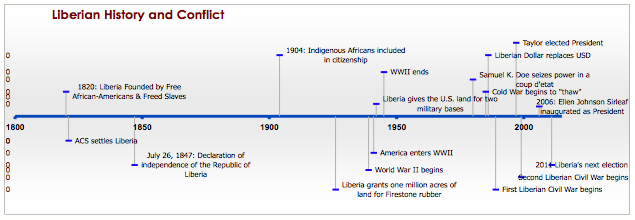
In a shotgun shell, this movie tells the story of the former Soviet Union's connection to the gun trade and the armament of developing nations. It was originally endorsed by Amnesty International. Follow this link to see the press release. http://www.amnestyusa.org/artists-for-amnesty/lord-of-war/page.do?id=1104972
The movie offers an "entertaining" look at the dynamics of the gun trafficking and the morality of assistance in conflict. I'm not generally a fan of Nicolas Cage; but he seems quite suited for the role of Yuri Orlov. (One of my biggest complaints with him is that he generally plays his roles flatly and uncconnvincingly. The fact that Yuri's character is flat and cold makes this work.) For example he says,
"The primary market was Africa, Eleven major conflicts involving twenty three countries in less than a decade. A gunrunner's wet dream. At the time the West couldn't care less, they had a white war in what was left of Yugoslavia."
The movie intersects Liberia's recent history in some fairly obvious ways. For example, the character of Andre Baptiste, Sr. is based mainly on Charles Taylor, former president of Liberia (who is currently sitting in trial for war crimes in Sierra Leone.)
Yuri is what I would call a war profiteer. In one scene where Interpol forces his gray-arms running plane to land on a rural road, he uses the locals people to hide contraband shouting "Bullets! Guns! Grenades! Hooray!"
This is one of many scenes that made me sad. To list a few others:
Image of child in Monrovia holding a wire weapon/gun.
Kaleshnikov kids. Boys brigade. (Yuri's indifference in this scene followed closely by his disapproval of his son having a toy gun is especially poignant.)
The visual elements and crafted drama of Lord of War really sticks with you and it raised some new questions for me. Experiencing the fully cultivated character, morality (or lack thereof) and choices of the main character was harrowing. These issues have not been on my radar for long, so I have to know, are these people really? At the end of the movie, Yuri says, "Unfortunately for you, I'm a necessary evil."
Another interesting character that provides some contrast is Yuri's brother, Vitaly. Vitaly's character with all of his flaws is one of the more compelling voices of morality in the movie. I agree with him--I don't believe that we can say "it's not our business, it's not our fight."
I recommend watching this movie if you'd like a broad look at issues of morality in intrastate conflict and how outsiders often benefit from conflict at the expense of many innocent people. The screenplay and storyline are easy to follow, leaving you prepared to think and converse generally about these issues without getting too weighed down with details and historical accuracy.
Here are the closing words that display on the screen prior to the credits. Please comment and tell me what you think:
"This film is based on actual events. While private gunrunners continue to thrive, the world's biggest arms suppliers are the U.S., U.K., Russia, France and China. They are also the five permanent members of the U.N Security Council."**
**Factual errors: This is slightly incorrect. According to information from the Stockholm International Peace Research Institute, the five biggest arms exporters in 2005 were, in descending order: USA, Russia, Germany, France and U.K., while China is the 11th.


No comments:
Post a Comment